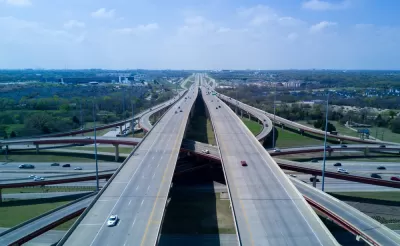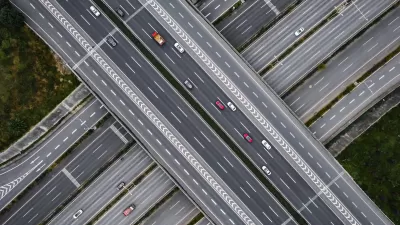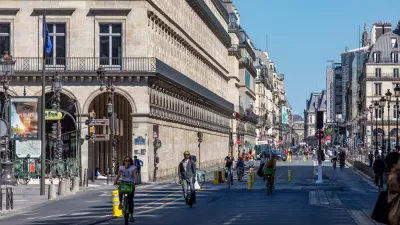Banning cars will not be effective as long as U.S. cities continue to prioritize transportation systems where mobility is dependent on driving.

Culdesac Tempe is a new Arizona development where cars will be banned—a strategy to encourage less driving, but one that does not address the broader issues, writes Joseph W. Kane. "Rather than focusing on an outright ban on cars, we need to make it easier for more people to live in places where shorter trips are the norm, and driving across an inefficient and inequitable built environment isn’t always necessary."
Culdesac Tempe’s vision is commendable, says Kane, but sustainability within the development will not change the fact that people still need to drive to get to work, shopping, school, and other destinations in the metropolitan Phoenix area.
Transportation systems too often privilege cars, and the car-centric landscapes of many American cities are reflected in trends in recent years such as the increase in vehicle numbers and vehicle miles traveled.
Kane suggests that the United States look abroad for examples of effective policies and design measures that foster density, decrease driving, and offer a range of transportation options. "European cities stand out here, from Barcelona’s 'superblocks' planning effort, to Ghent’s pedestrian zone, to Copenhagen’s bicycle highways."
But some cities in the United States have also implemented strategies that are making a difference, notes Kane, including pedestrian-friendly neighborhood design, parking minimums, and congestion charges. "These efforts encourage people to drive less, while incentivizing the creation of more walkable, livable communities."
FULL STORY: Banning cars won’t solve America’s bigger transportation problem: Long trips

Maui's Vacation Rental Debate Turns Ugly
Verbal attacks, misinformation campaigns and fistfights plague a high-stakes debate to convert thousands of vacation rentals into long-term housing.

Planetizen Federal Action Tracker
A weekly monitor of how Trump’s orders and actions are impacting planners and planning in America.

In Urban Planning, AI Prompting Could be the New Design Thinking
Creativity has long been key to great urban design. What if we see AI as our new creative partner?

Cal Fire Chatbot Fails to Answer Basic Questions
An AI chatbot designed to provide information about wildfires can’t answer questions about evacuation orders, among other problems.

What Happens if Trump Kills Section 8?
The Trump admin aims to slash federal rental aid by nearly half and shift distribution to states. Experts warn this could spike homelessness and destabilize communities nationwide.

Sean Duffy Targets Rainbow Crosswalks in Road Safety Efforts
Despite evidence that colorful crosswalks actually improve intersection safety — and the lack of almost any crosswalks at all on the nation’s most dangerous arterial roads — U.S. Transportation Secretary Duffy is calling on states to remove them.
Urban Design for Planners 1: Software Tools
This six-course series explores essential urban design concepts using open source software and equips planners with the tools they need to participate fully in the urban design process.
Planning for Universal Design
Learn the tools for implementing Universal Design in planning regulations.
Appalachian Highlands Housing Partners
Gallatin County Department of Planning & Community Development
Heyer Gruel & Associates PA
Mpact (founded as Rail~Volution)
City of Camden Redevelopment Agency
City of Astoria
City of Portland
City of Laramie





























